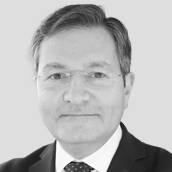
Teymour Kooros is Head of Wealth at Standard Bank Namibia. He works with high-net-worth individuals and families in Namibia and Southern Central Africa, focused on wealth preservation and risk mitigation.
The increase in individual and familial wealth in Southern Central Africa is coinciding with a generational shift in ownership and leadership in family-owned businesses. Wealth preservation is coming into sharp focus for the wealthy as they consider wealth distribution, succession planning, and the survival of family-owned businesses. Laying the foundation for the sustainable future transfer of wealth from one generation to the next is becoming a key concern for families in the region.
Over the past decade, Southern Central Africa has started to register on the continent’s list of country wealth rankings. The Henley Private Wealth Migration Dashboard reveals that when taken as a block, Botswana, Mozambique, Namibia, and Zambia collectively ranked 6th in terms of private wealth on the continent with USD 77 billion, 5th in terms of the number of high-net-worth individuals and multi-millionaires, and tied in 6th place with Tanzania for the number of centi-millionaires. Forecasts for 2031 reflect strong growth rates of more than 50% for Mozambique and Zambia, with 20% to 40% for all others.
According to Standard Bank’s survey of wealthy families in Africa,[1] since 2014, less than 20% have developed a succession plan, 70% of family wealth in Africa is lost by the second generation, and 90% by the third generation. The generations preparing to transfer wealth are concerned — 70% fear that the next generation will squander or mismanage their inheritance, 60% prefer their wealth to be divided fairly between their children, 60% are concerned regarding inheritance taxes (depending on the country), and 60% believe that the next generation should adapt to local and regional economic conditions and disruptions so that they learn to earn their livelihood.

Similarly to other regions of Africa, in Southern Central Africa, family-owned wealth comprises individual assets and business holdings, sometimes in multiple jurisdictions. Now, for the first time, the generation poised to inherit often includes those studying (over 30%) and working overseas. As a result, the transference of wealth is open to risks that are at times not obvious, including tax, legal, and regulatory, which can have an unintentional impact. Careful planning is therefore required in advance of any decision being taken.
In Southern Central Africa, succession planning is interpreted by wealthy families to include maintaining the ethos established by the founders; ensuring business continuity, the welfare of their workers, and the sustained commerciality of business through innovation and expansion into new ventures and jurisdictions. This is particularly true in Botswana, Namibia, and Zambia where the largest employers in the private sector continue to be family-owned or controlled companies. The objective translates to preserving wealth for future generations, avoiding family conflicts over succession and wealth distribution, and leaving a legacy that ensures the wellbeing of their families and the education of their children and grandchildren.
For some, the decision to establish an international fiduciary structure in the succession strategy may at first appear alien, a solution that does not correlate to the domestic need for wealth preservation. The decision to consider such a change is increasingly driven by the actions taken by the next generation, to be educated, to work, and to live abroad. This has led to the realization that an international fiduciary solution can be a key component of the succession strategy, providing a more complete solution.
An example of the evolution in mindset is visible in Namibia. Until recently, family-owned businesses in the agricultural, transport, and fast-moving consumer goods sectors utilized a combination of a will and a domestic trust structure as the preferred fiduciary solution to manage family business assets. Increasingly, international fiduciary structures are being considered for the flexibility they provide in helping families manage their wealth, considering the individual or business owner’s circumstances and objectives, whether to grow, spend, or transfer wealth during the business owner’s lifetime or implement a plan for the distant future.
Given that international solutions to wealth preservation are relatively new in the region, consideration takes time. The preferred approach is incremental to the structuring of family assets and interests that form the family succession plan. For families seeking to preserve wealth during generational transfers, and for those planning to attract international investors, establishing an international structure can provide an appropriate solution. The challenge is two-fold: planning the structure, and the family agreeing to the strategy. Discussing family views, addressing any concerns of peers with involvement in prior decision-making, removing ambiguity to proposed structures, and listening to the aspirations of the next generation each help ensure a cohesive message and understanding of the next generation’s vision for wealth succession.
Examples of solutions include: A liquidity event resulting in a trust structure holding a discretionary portfolio to support a family outside the family’s personal names, providing an additional layer of protection; a wealthy individual with successful businesses and significant personal assets who holds a US passport engaging specialist US advisers seeking expertise to protect their family wealth with an international dimension; and a wealthy family planning to support their grandchildren’s education and future professional aspirations through monetary gifts using a trust framework. The trust provides governance and oversight on how the funds are managed, accessed, and used. Family members can seek expert guidance from their trustee, and the structure ensures the separation of business investments and personal assets.
As the wealth of individuals and families grows in complexity and beneficiaries are disbursed across geographies, the importance of planning for the preservation of wealth grows too. Southern Central Africans are increasingly seeking a wealth preservation solution with a fiduciary services provider who can work with them and their family, family office, or family trusted advisor to provide qualified, professional services in banking, investment, accounting, law, and trust.
The wealthy are increasingly realizing that financial education on wealth preservation is a key ingredient in wealth management and preservation. It should be a part of the continuum, not be considered solely at the end of life. It is therefore important to equip families to manage wealth responsibly. The first steps are to engage professionals to identify needs, and to work together over time to develop solutions that meets each family’s unique circumstances.
Source
[1] The Wealth Report 2016 - Knight Frank, launched in South Africa in partnership with Standard Bank Wealth and Investment